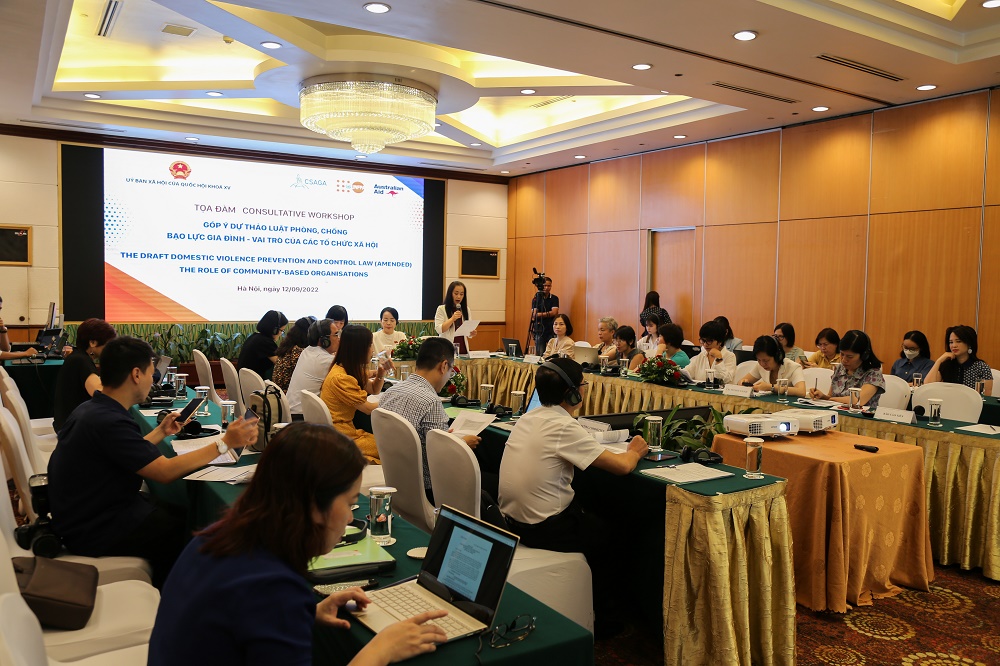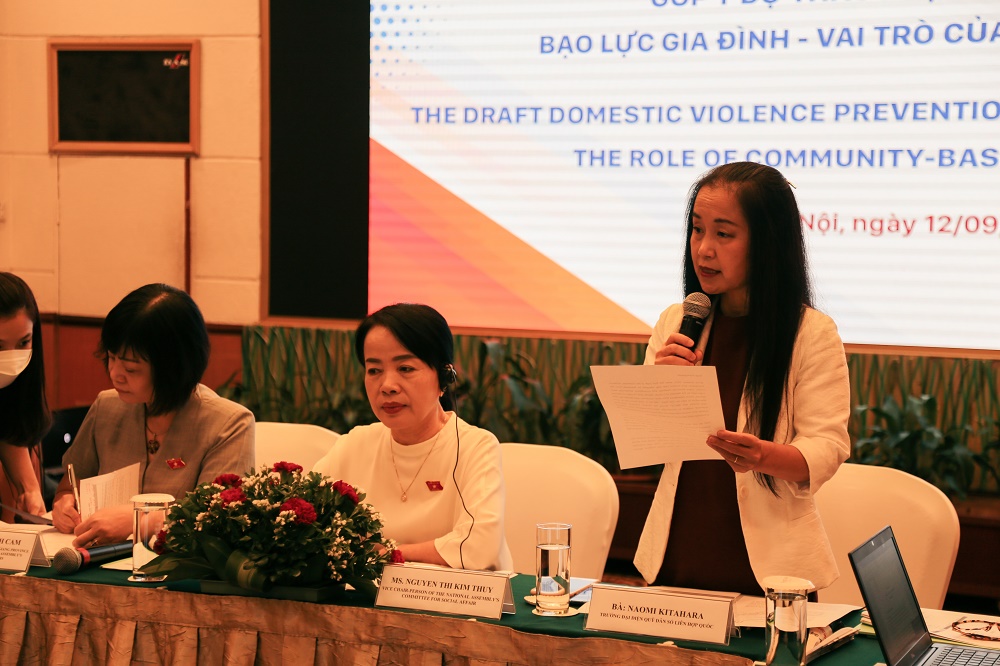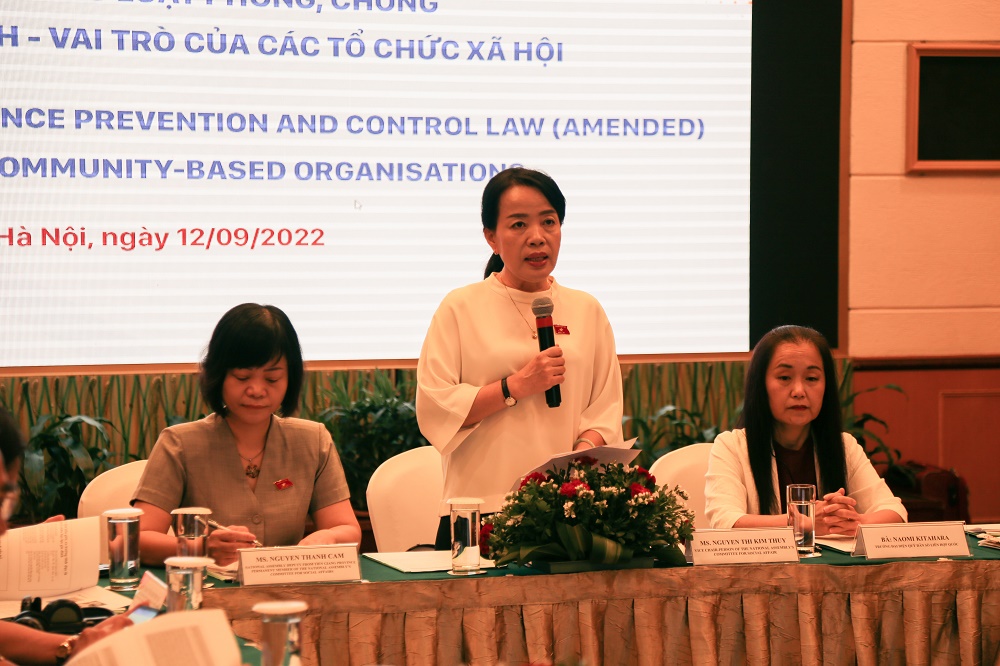It’s time to amend law against domestic violence
Experts highlighted the necessity of amending the law as this type of abuse leaves 63% of women in Vietnam suffering from at least one kind of domestic violence.
Both domestic and international experts have agreed that it’s high time to strengthen Vietnam’s Law on Domestic Violence Prevention and Control which was promulgated by the National Assembly in 2007.
| Participants at the event held in Hanoi on Sept 12. Photos: UNFPA |
The news was shared at a consultative workshop held in Hanoi on September 12 by the National Assembly’s Committee for Social Affairs in collaboration with the Center for Studies and Applied Sciences in Gender – Family – Women and Adolescents (CSAGA) to review the draft amended Domestic Violence Prevention and Control (DVPC) Law which was first released for feedback from the public in October 2021.
Representatives from social and community-based organizations shared with the National Assembly deputies their activities in addressing domestic violence and discussed mechanisms to join forces in tackling domestic violence in Vietnam.
In her opening remarks, the UNFPA Representative to Vietnam Naomi Kitahara said: “UNFPA is very glad to see that the revised Law on Domestic Violence Prevention and Control has been based on a human rights approach, incorporating international lessons, and good practices."
UNFPA has recommended strengthening the effectiveness of state institutions while creating favorable conditions for community-based organizations and non-governmental organizations to contribute to the implementation of policies and programmatic interventions to tackle domestic violence in Vietnam.
| UNFPA Representative to Vietnam Naomi Kitahara speaks at the event. |
“The survivor–centered approach has been applied to ensure the rights of domestic violence survivors, and their needs and voices have been taken into account seriously. This was important, especially in the context of Vietnam where violence against women is mostly hidden,” Kitahara affirmed.
High on the agenda of the workshop, which was jointly supported by UNFPA and the Government of Australia, was the presentation by the National Assembly’s Committee for Social Affairs relating to the latest revision of the draft DVPC Law, following the comments by the National Assembly in June 2022.
Experts from Vietnam’s GBV Net and CSAGA shared the participants with their experience and best practices in domestic violence prevention and control, especially innovative communications activities to raise public awareness and address domestic violence.
The participants also heard about international experiences in a video message shared by Ambassadors and Heads of Delegations in Hanoi, including Australia, Canada, the EU, Spain, Sweden, and the UN.
| Nguyen Thi Kim Thuy, Vice Chairwoman of the National Assembly’s Committee for Social Affairs at the workshop. |
Nguyen Thi Kim Thuy, Vice Chairwoman of the National Assembly’s Committee for Social Affairs said: “We acknowledged the information and experience shared at the workshop today, including international experience and best practices in addressing domestic violence, especially from Australia with the highlight of the mechanisms of engaging social organizations in delivering services as well as the development of specialist courts for domestic violence, and the evidence-based policy development.”
Since the amendment of the law in 2021, many technical meetings and consultative workshops were organized by the Ministry of Culture, Sports and Tourism (MoCST) to discuss options, share experiences from other countries, and debate the best alternative to take for Vietnam. More consultative meetings will take place in Vinh Phuc and Nha Trang in the coming weeks.
The amendment focuses on the provision of essential and integrated services for domestic violence survivors. It requested the relevant stakeholders to pay further attention and provide financial and technical resources during the law building.
After the amended DVPC Law was elaborated at the National Assembly’s plenary session in June, the National Assembly Committee for Social Affairs and MoCST incorporated all the feedback and comments and finalized the latest draft version with 56 articles.
UNFPA has been working very closely with MoCST during the revision process, providing technical and financial support to incorporate recommendations from different studies and ensure international standards and commitments on the prevention and response to domestic violence.
The current Law on Domestic Violence Prevention and Control was approved by the 12th National Assembly on November 21, 2007, and took effect on July 1, 2008. However, the National Study on violence against women in Vietnam in 2019, which was conducted by Vietnam’s General Statistical Office and the Ministry of Labor, Invalids and Social Affairs (MOLISA), with support from Australia and UNFPA, showed little change in violence against women since the 1st study in 2010. In particular, 62.9% of women in Vietnam experienced at least one form of physical, economic, emotional, and/or sexual violence and controlling behaviors in their lifetime. In addition, 90.4% of survivors of violence did not seek any help from authorities, while half of them never told anyone about the violence. Thus, domestic violence is hidden in society, and it is an alarming issue.
Nguyen Van Anh, Founding Chairwoman - Director of Hanoi-based CSAGA said: “In the past 15 years, social organizations and non-governmental organizations made a lot of positive contributions to the Government’s efforts to end domestic violence. With the revision of the current Law, favorable conditions can be created for social and community-based organizations to be fully engaged in the Government’s programs to prevent and control domestic violence.
She said perspectives shared at this workshop will be considered and incorporated in the draft amended Law on Domestic Violence Prevention and Control in order to promote community-based activities in the coming years.
Sharing with The Hanoi Times, lawyer Pham Ha My from the Hanoi Lawyers Association, said the law on domestic violence must be finished because this type of abuse breaches human rights in the family context and undermines the fundamental principles of the family, having a negative impact on family life, the community, and society. Vietnam is working to safeguard the interests of family members and promote social stability as a result.
The DVPC Law (amended) is expected to be approved by the National Assembly at its plenary session in October 2022.











